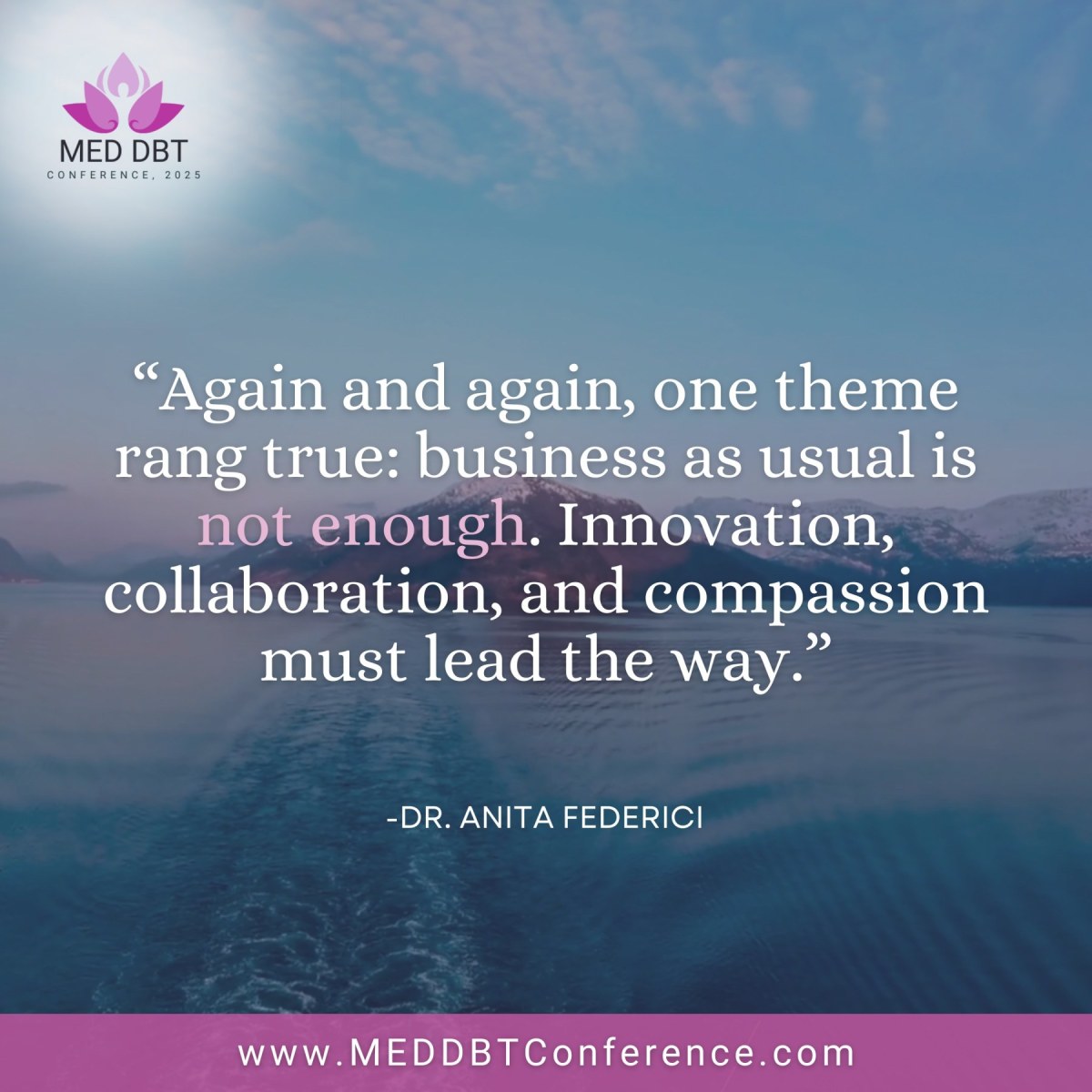Written by Dr. Anita Federici. The MED-DBT Conference 2025 brought together clinicians, researchers, and leaders committed to advancing multidiagnostic eating disorder care.
On September 24th and 25th, 2025 our conference committee had the honor of welcoming colleagues from around the world to the first-ever Multidiagnostic Eating Disorder DBT (MED-DBT) Conference: Reimagining Recovery Approaches, An Invitation to Collaborate.
When we first imagined this gathering, our hope was simple but ambitious: to create a space where clinicians, researchers, students, and trainers could come together to share knowledge, challenge each other, and build a true community of practice around MED-DBT. What unfolded over those two days far surpassed anything we could have envisioned.
Why This Conference, Why Now?
For too long, there has been a group of individuals with eating disorders who have been left behind by conventional models like FBT or CBT-E. These clients face chronic suicidality, self-injury, trauma, relational difficulties, and other co-occurring psychiatric and medical conditions. They are too often labeled “treatment resistant” or even “terminal.”
MED-DBT was developed to respond directly to this need. The model is not a small adjustment to existing approaches but a comprehensive framework, grounded in decades of DBT and ED research, and adapted for the nuanced, multi-diagnostic presentations we see in practice. MED-DBT is about providing treatment for an under-served group of people that is both evidence-based and deeply compassionate.
From Consultation Team to Global Conference
This all began years ago with a small consultation group, where Kim Claudat, Charlotte Thomas, Shelly Hindle, and I supported each other in applying DBT to our clients with

multidiagnostic eating disorders. As our conversations deepened, so did our recognition that something larger was needed. That team grew into our conference committee, and with the growth of the MED-DBT community and listserv, the vision for this conference took root.
Seeing that vision realized this September – with colleagues joining across time zones and continents -was both humbling and historic.
Highlights That Stood Out
Across our keynote address, panels, lightning rounds, and workshops, a few themes emerged clearly for me:
Many sessions at the MED-DBT Conference 2025 highlighted the global momentum behind the MED-DBT protocol and the innovation emerging across clinical settings.
- Innovation is essential. Business as usual is not enough for clients with multidiagnostic needs.
- Collaboration across borders strengthens us. Clinicians and researchers worldwide are coming together to refine and expand MED-DBT.
- The call to research is urgent. We were challenged to move beyond anecdote and build the rigorous evidence base this model deserves.
There were so many powerful sessions – from Stage II MED-DBT applications, to integrating FBT and DBT, to affirming adaptations for neurodivergent and LGBTQIA+ clients, to embedding trauma treatment directly into eating disorder care. Each session reminded me both of the complexity of the clients we serve and the creativity, rigor, and compassion that define this community.
Again and again, one theme rang true: business as usual is not enough. Innovation, collaboration, and compassion must lead the way.
Honoring Dr. Lucene Wisniewski
One of the most meaningful moments for me was introducing our keynote speaker, Dr. Lucene Wisniewski. Lucene has been a role model for me since the early 2000s, when I first encountered her work while trying to integrate DBT into eating disorder treatment. Over time, admiration grew into mentorship, collaboration, and now co-authorship.
Her keynote embodied what makes her such a force in this field: evidence-based expertise combined with fierce compassion and deep respect for clients. I will always be grateful for her leadership and her willingness to shape MED-DBT with me and so many others.
Looking Ahead: Building the Future of MED-DBT
As we closed the conference, I shared some of the exciting next steps for MED-DBT:
- The first MED-DBT book, available December 22, 2025 from Guilford Press.
- Collaborative, multi-site research initiatives to strengthen the evidence base.
- A developing adolescent adaptation and companion book.
- The Caregiver MED-DBT Project, bringing skills and strategies into family systems.
- Expansion of MED-DBT into day treatment, inpatient, and residential programs.
- And the creation of the first dedicated MED-DBT training site, opening Winter 2026, in collaboration with Lucene.
These are milestones, but they are also stepping stones. The bigger vision is about building a global community of practice and research that ensures no one is left without a viable path to recovery.
Gratitude and Recognition
I want to thank my fellow committee members – Kim, Charlotte, and Shelly – for their brilliance and dedication. I also want to thank our moderators, administrative and technology staff (including Paul Federici, Marissa Adams, Emily Axner, Will Schutt, and Jodi Oschefski), and all of our sponsors: The Emily Program, UC San Diego, The Centre for Psychology + Emotion Regulation, Pacific Premier Group, Rogers Behavioral Health, The Hospital for Sick Children, and The Center for Discovery. Your support made this possible.
And to every presenter and attendee: thank you for bringing your knowledge, curiosity, and hope. The energy you brought to this inaugural conference is what will carry MED-DBT forward.
Closing Reflection
We began this conference with an invitation to collaborate. As we move forward, that invitation remains open. Whether your contribution is through research, clinical practice, training, advocacy, or education, you are part of this movement.
The story of MED-DBT is still being written. And it will be written by all of us.
With gratitude,
-Anita Federici
